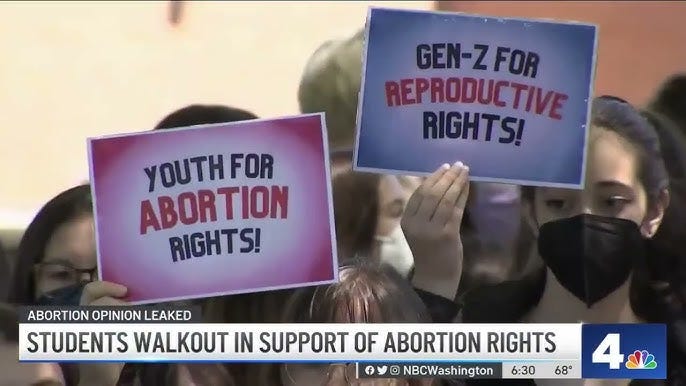Fairfax County Schools Under Fire: A Deep Dive into the Abortion Allegations and Their Far-Reaching Implications
In Fairfax County, Virginia, a disturbing controversy has erupted, shaking the foundations of trust in its public school system. Fairfax County Public Schools (FCPS) has launched an investigation into allegations that faculty and staff at Centreville High School arranged abortions for students without their parents’ knowledge or consent.
The Investigation: Uncovering a Hidden Scandal
The allegations surfaced when two former students accused school officials of orchestrating abortions in 2021. One student, a minor at the time, claims that school social worker Carolina Díaz scheduled and funded her abortion using school resources, bypassing parental notification.
The second student alleges she was pressured into the procedure despite wanting to keep her baby, with then-principal Chad Lehman reportedly aware of the situation. These actions, if true, occurred without the knowledge or consent of the students’ parents, sparking immediate outrage.
FCPS responded swiftly, stating, "We learned yesterday of these concerning allegations from 2021. We are launching an immediate and comprehensive investigation as we take all concerns of student wellbeing very seriously." When asked if staff had ever arranged abortions, the district claimed, "Not to [our] knowledge." Yet, the investigation is ongoing, and the allegations have already fueled a firestorm of debate about accountability and parental rights.
A Gross Violation of Parental Consent
The heart of this scandal lies in its blatant disregard for parental consent—a cornerstone of both Virginia law and ethical responsibility. Virginia requires that a parent or guardian be notified before a minor undergoes an abortion, unless a judicial bypass is granted. No such bypass was sought in these cases, suggesting that the staff’s actions were not only unethical but potentially illegal. FCPS policy encourages students to discuss pregnancy with their parents but stops short of mandating staff to inform them, creating a gray area that critics say enabled this breach.
This violation is more than a procedural misstep; it’s a betrayal of trust. Parents send their children to school expecting educators to act in their best interests, not to make unilateral, life-altering decisions behind their backs. The use of public funds to facilitate these abortions compounds the offense, turning a personal violation into a public scandal. For many, this is a criminal act—contributing to the delinquency of a minor, misusing taxpayer money, and flouting state law. The staff involved could face serious charges, yet the question remains: will justice be served?
Cultural Reflections: Pro-Life Values vs. Evolutionary Realities
Culturally, this incident challenges us to confront our stance on life and its limits. Many argue that we should all be pro-life, valuing the sanctity of human potential from conception. Yet, nature complicates this view—evolutionary infanticide exists across species, including humans, often as a survival mechanism in extreme circumstances. While this biological lens offers context, it doesn’t justify unrestricted abortion. As a society, we must set thresholds, balancing individual rights with collective ethics.
The left often pushes for abortion access up to nine months, dismissing late-term restrictions by claiming such cases are rare or nonexistent. But if they’re truly rare, why oppose laws against them? This logical inconsistency frustrates pro-life advocates, who see the Fairfax County allegations as evidence of a slippery slope. When schools—trusted institutions—overstep into such decisions, it underscores the need for clear limits and oversight.
A Federal Issue, Not Just a State Matter
Former President Trump relegated abortion to the states, but this case highlights why it’s a federal issue tied to civil rights. The right to life, many argue, is a universal principle that transcends state borders, especially when public institutions and funds are involved. In Fairfax County, the alleged actions of school staff implicate not just Virginia law but broader questions of accountability and justice. Criminal charges—whether for violating parental notification laws or misappropriating funds—should be pursued by both state and federal authorities.
Yet, skepticism abounds. Florida’s former Attorney General Pam Bondi, cited by some as an example, was perceived as lackluster on similar issues during her tenure, raising doubts about whether Virginia or federal officials will act decisively. Parents are left wary, wondering if the system will protect their rights or shield its own.
The Fallout: Parents Flee a Broken System
This scandal is a tipping point for many families already disillusioned with public schools. Beyond “perverted teachers,” as some call them, the system faces criticism for its “cookie-cutter” approach—designed, some say, for girls and structured like a factory to churn out compliant workers. The Fairfax allegations amplify these concerns, driving parents to private schools or homeschooling. To compensate for the loss of socialization—a key strength of public education—families are turning to sports and extracurriculars, seeking safer, more tailored options for their children.
The socialization aspect of growing up in public schools remains invaluable, fostering friendships and resilience. But when “bad teachers” undermine trust, as in this case, the cracks in the system become impossible to ignore. Parents are voting with their feet, and Fairfax County may accelerate this exodus.




